Movie Review – Inglourious Basterds
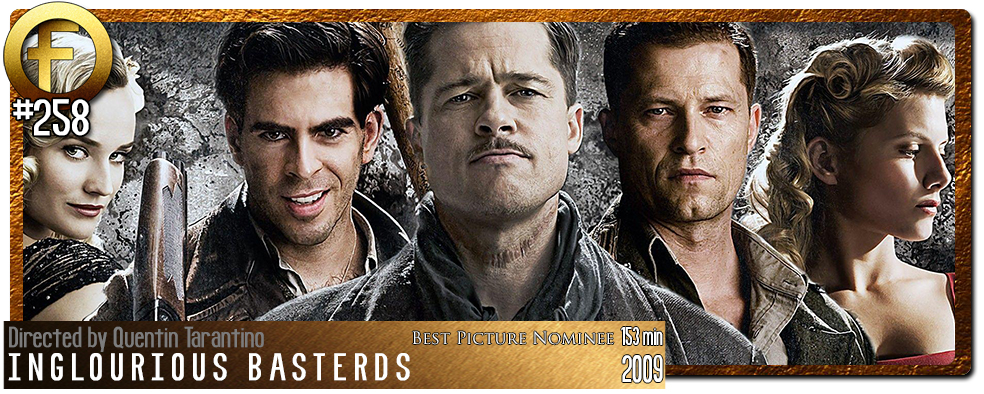
Cast : Brad Pitt, Christoph Waltz, Dianne Kruger, Eli Roth, Til Schweiger, Melanie Laurent, Michael Fassbender, Daniel Bruhl, Gedeon Burkhard, Jacky Ido, BJ Novak, Omar Doom, August Diehl, Denis Menochet, Lea Seydoux, Sylvester Groth, Martin Wuttke, Mike Myers, Julie Dreyfus, Richard Sammel, Rod Taylor.
Synopsis: A group of Jewish-American solders are mandated to hunt down and kill anybody wearing a Nazi uniform, during World War II. A young cinema owner hatches a plan to rid the world of the Nazi high command structure in one swoop, by blowing up her cinema during a propaganda premiere. Plus, there’s scalpings galore.
******************
I have to admit, he does keep surprising me. Tarantino, that is. His constant ability to concoct the most devilishly intelligent dialogue and set-pieces really does set him apart from any other director today. While many give their all in blowing stuff up and an inordinate number of effects shots, Tarantino maintains his integrity through sheer power of his dialogue. In the same vein as Pulp Fiction and Kill Bill Pt 2, Tarantino manufactures a wonderful script into an effortlessly entertaining (if somewhat violent) film, Inglourious Basterds. Although labelled as a remake by many online sources, this version of the film to bear the Basterd name is a re-do in name only. The film still tips the hat to many previous war stories, and in a kind of irony, delivers perhaps the best distillation of war within a film that’s essentially a fantasy. A fairy tale. You see, Tarantino perverts actual history in favour of a more fanciful course of events that, had they actually been real, would have changed history altogether. Still, the filmmaker isn’t shy about the fact this is a fantasy story, a “what if” is you will, and as long as you take that into consideration, you’ll enjoy this film just fine.
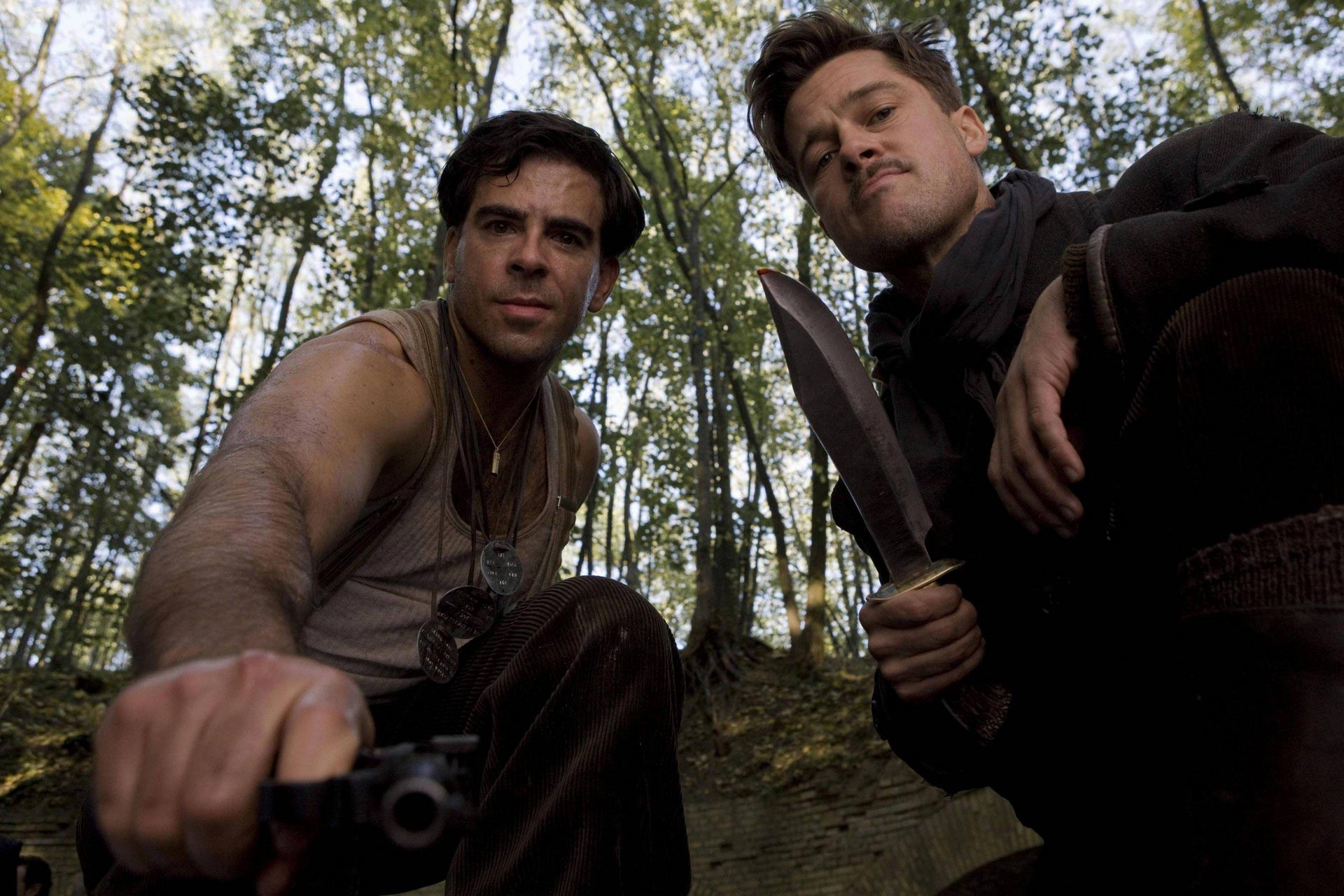
Inglourious Basterds takes place during World War II, with a group of Nazi-hunting American soldiers seeking out, and horrifically killing, any and all German solders they find, without remorse. Their actions make them both legendary and feared among the Germans, with their ultimate goal to destroy Hitler and his high command structure. The leader of the Basterds, Aldo Raine (Brad Pitt, with a great Tennessee accent), also known among the Germans as Aldo the Apache, heads the group of Basterds with a lackadaisical calm that defies his situation. He and his squad of soldiers delight in causing the maximum mayhem and carnage among the German troops with their butchery, including scalping those they kill. A young girl in Paris, who owns a small cinema, meets a local German war hero, and becomes an unwilling pawn in the German propaganda machine when she agrees (against her will, of course) to host the Parisian premiere of the latest Joseph Goebbels film, Nation’s Pride. Among those scheduled to attend the premiere is the majority of Hitler’s high command, and even the Führer himself. The film’s central villain is one SS officer Colonel Hans Landa (Christoph Waltz, in a role I think deserves nomination at the Oscars this year….), the Jew Hunter, who seeks out the Jewish population and exterminates them. The films opening twenty minutes is dedicated to showing us just how Machiavellian and evil this man is, regardless of his affectation of civility and benevolence. Landa is a bad, bad man. In one of the films less star-powered sequences, Landa arrives at a French country residence to interrogate a local man about the whereabouts of some known Jewish families in the area. One of those families is missing, and we learn that Landa suspects they are hiding in the house he’s in (he’s also right!). This one event sets in motion the chain of sequences that follow, all carefully and methodically plotted out by the masterful Tarantino.
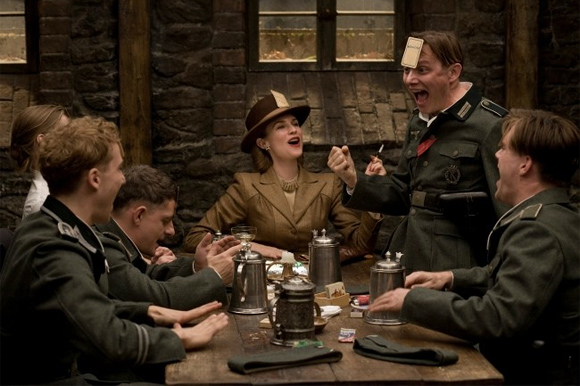
The film is segregated into four parts, the first of which is a fairly lengthy conversation between two people, all tense and expectant. Landa, and his prey, convey the cat-and-mouse attitude implemented by the French resistance of the time, the toothy Landa smiling his way through the horrific opening moments. He’s the devil, a self proclaimed “detective” to the Nazi’s, and takes great pride in his role, and in his success. The second part introduces us to the Basterds, including both their recruitment of psychopathic Nazi traitor Hugo Stiglitz (Til Schweiger) and the torturous extraction of information from a Nazi patrol. Part 3 of the film involves Shoshanna (Melanie Laurent), the only survivor of the opening sequence, who is now living as the cinema owner under an assumed name. When Germany’s great white hope Frederick Zoller (Daniel Bruhl) spots her as she’s changing the cinema placard out front, his unwanted attention soon draws her into the Nazi circle; her cinema is chosen by Zoller (and subsequently agreed to by Goebbels himself) to be the locale of the premiere of his latest film, Nations Pride, a retelling of Zollers great war adventure in which he killed hundreds of Allied solders from a snipers nest. Shoshanna, who sees this opportunity to destroy the Nazi command structure as a golden one, plans to lock the audience watching the film inside the cinema, and set fire to the building with highly flammable nitrate film stock. Her boyfriend/lover Marcel (Jacky Ido) goes along with her plan. The fourth part of the film explains Operation Kino, the plan to assassinate the Nazi commanders inside the cinema, which has been devised by the British. They send in a couple of officers to assist the Basterds in planning and carrying out the operation. They meet up with German actress Bridget von Hammersmark (Dianne Kruger, sexy as hell!), who is secretly working for the British, in a bar to discuss and plan the operation. The meet goes a little pear-shaped when a ranking SS officer scrutinises the British agents’ German accents, and things begin to get tense.
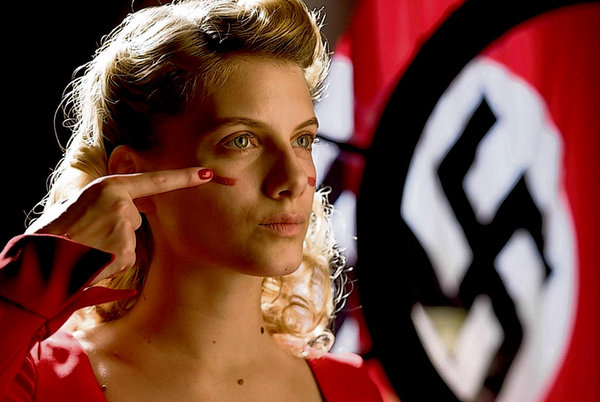
And the final act, the denouement of the film, in which all the characters and their conspiratorial plans come to fruition (or not, in some cases), and where the film really grabs you by the throat and throws you about a bit. Tarantino has managed to top even the great moments in Kill Bill and Deathproof, his dialogue and raw tension on films captured for all to see, and it’s beautiful. To be honest, I always felt Kill Bill Pt 2 and Deathproof got a little talky with no pay-off, more cheeky scripting for the sake of it than anything actually meaningful. Take the fob-watch sequence of Pulp Fiction, perhaps the single greatest dialogue sequence ever committed to film, which holds you in rapt attention (perhaps due in large part to Christopher Walkens wonderful staccato delivery) throughout the moment. It’s this great ear for dialogue that set’s Tarantino apart from the rest, his ability to convey just about anything he wants in a single line of text is sublime. In Inglourious Basterds, Tarantino again shows us his prowess. The opening sequence, in which Landa interrogates a French farmer, is both nonchalant and terrifying, for it’s tense anticipatory vibe. Landa, like a cat stalking his prey, lulls the French farmer into a false sense of security that nothing bad will happen, befuddles the man’s daughters and drinks the man’s milk. Then he pounces, uncovering the location of the hidden French family and ordering the massacre. All with a large, friendly grin on his face. It’s absolutely riveting, and perhaps rivals much of the great directors past work.
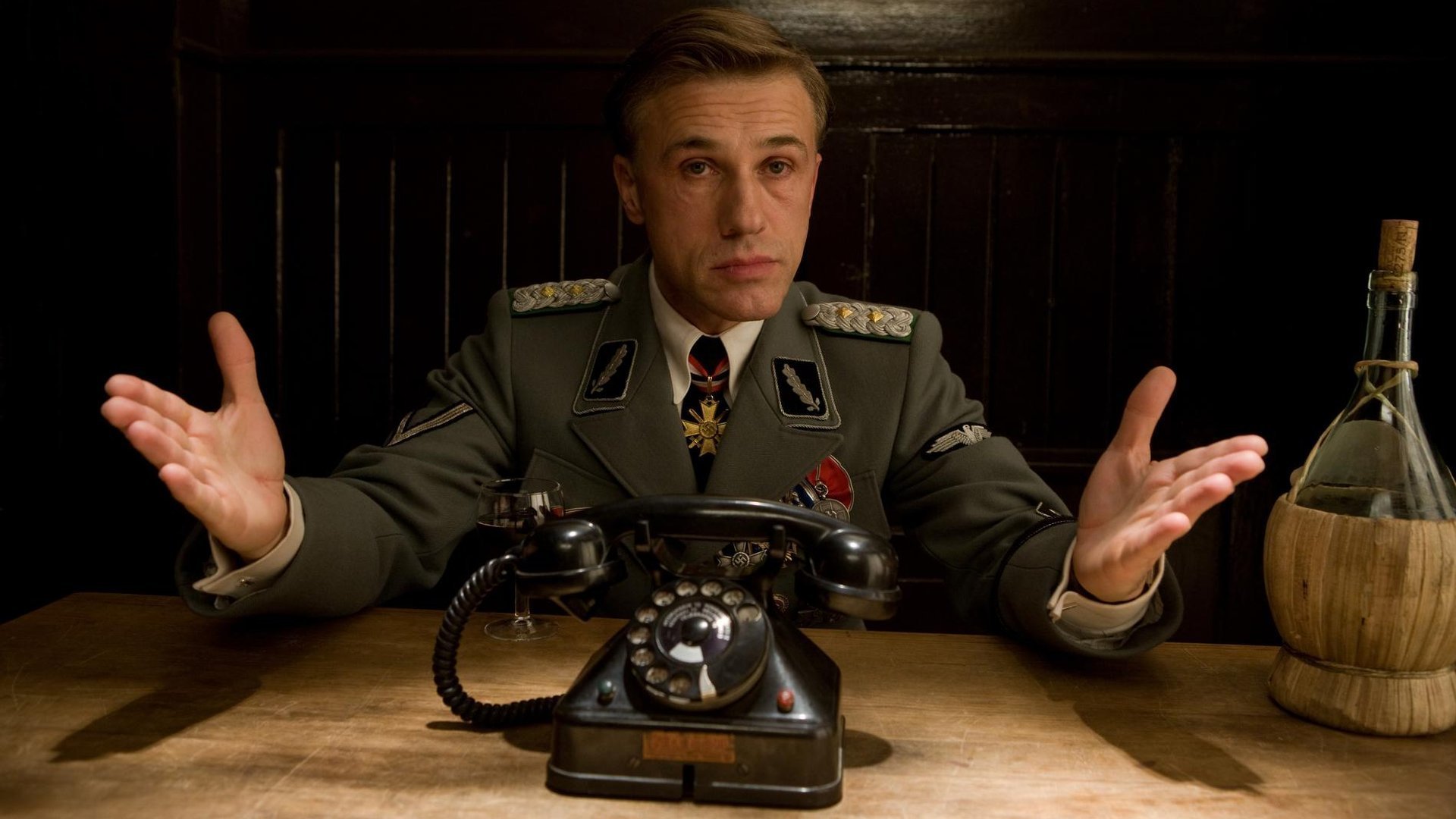
Okay, so you’re thinking I have a thing for Tarantino…. you’d probably be half right: I do think the man is a genius, perhaps destined to become one of the great directors of all time, alongside Ford and Lean, Hitchcock and Spielberg. With Inglourious Basterds, he’s redeemed the overly sluggish Deathproof by giving is a whimsical flight of fancy, and it’s beautiful. Tarantino knows how to set up a scene, where to put the camera, and how to edit the thing to the n-th degree, until it’s perfect. An almost unrecognisable Rod Taylor (who appeared in Hitchcocks The Birds, wouldn’t you know) plays Winston Churchill in a small cameo moment, alongside Mike Myers doing a passably impressive British accent that’s a long way from the overkill of Austin Powers, as a British General. Fellow film director Eli Roth, responsible for the odious Hostel films, as well as the tenuously scary Cabin Fever, appears as one of Aldo Raine’s squad, known as the Jew Hunter, for his penchant for killing Nazi solders with a baseball bat. Roth also appeared (in a really unnecessary role) in Deathproof. It’s the little nods to the audience, the fans, that makes these films so wonderfully captivating. Tarantino manages to cram more style and substance into a single scene of this film than many directors can muster in their entire careers! His master-stroke, however, is the casting of Melanie Laurent, as Shoshanna, a Jewish French girl who takes on the Nazis in one defiant act of revenge. Laurent is luminous in the role, a strength and fierce determination that startles the viewer with it’s natural charm and power. There’s a fair certainty this young actress is going to become more familiar to Western audiences (she’s appeared in numerous French films prior to Inglourious Basterds) after this.
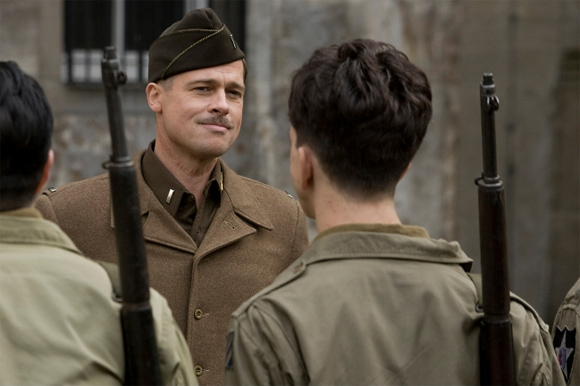
But the star of the show is not Brad Pitt, as you might otherwise imagine. No, it’s Christoph Waltz, as Landa. He steals every scene he’s in, makes the film his own, and considering the ensemble nature of Tarantino’s work that’s some accomplishment. Waltz has been a stage and screen actor for some years now, and it’s highly likely that this role will catapult him to A-list status. His portrayal of Landa is simply astonishing, filled with the malevolent glee we often associate the Nazis with as they go about their mantra of killing Jews. Without Waltz performance here, it’s unlikely the film would be as strong emotionally. After all, you have to hate Landa, you have to despise the man, and if the actor playing him is unable to accomplish this, the character will fail and the film becomes weaker, less powerful, because of it. Indeed, I think Waltz has done such a great job, I’d go and put money on and Oscar nod this year for sure.
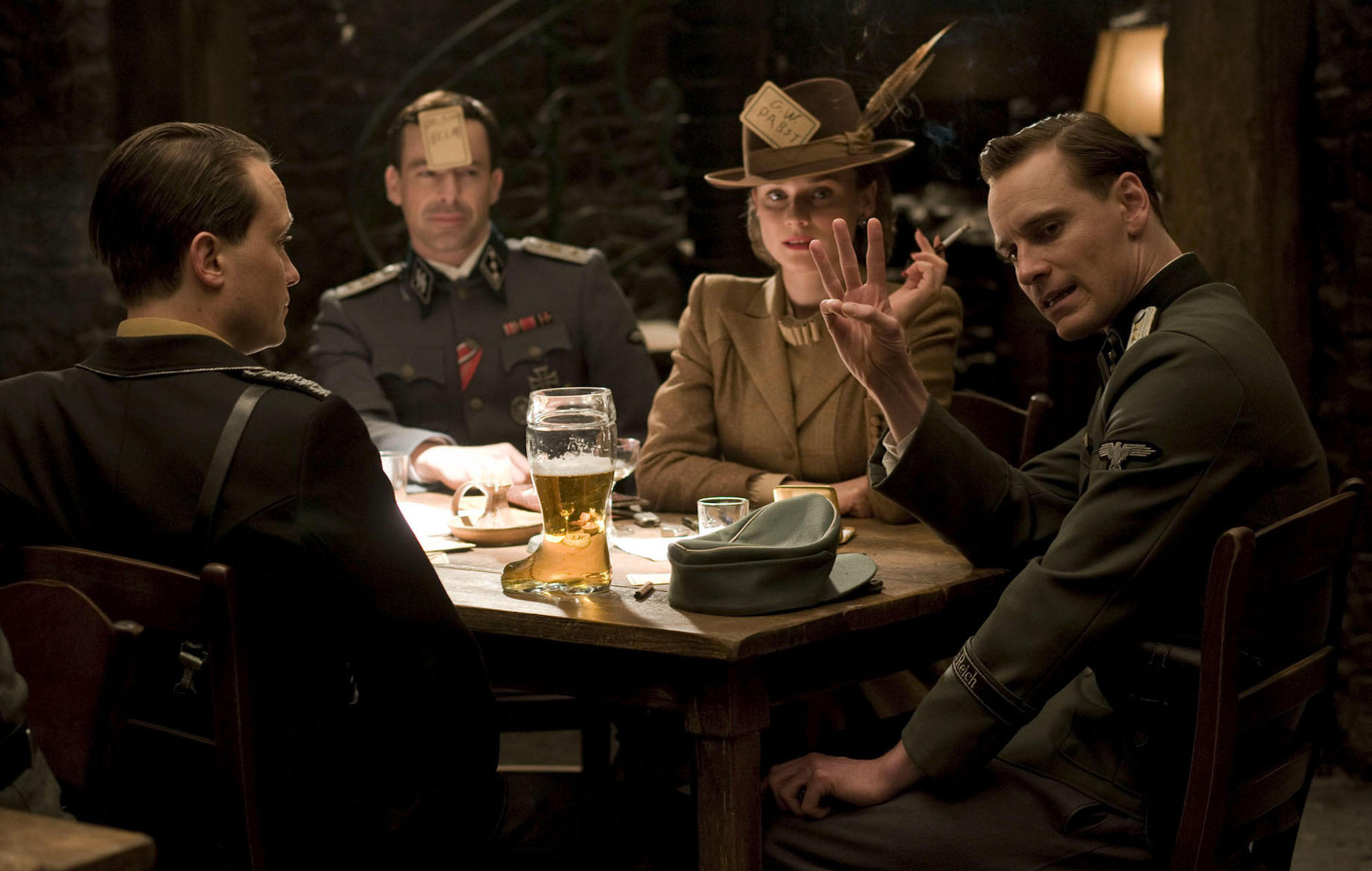
I will admit to being unable (unwilling?) to find something to really criticise Tarantino’s latest work on; the pacing, the structure, the performances, the technical aspects: each of the key elements that go into film-making have succeeded perfectly here. The music, cinematography and editing are all first rate, the film most definitely destined to become a genuine classic. I loved the Basterds, and loved it so much I am struggling for enough hyperbole to ensure you go out and watch it. If you missed it in cinemas, grab it on DVD or BluRay and have a gander. It’s not only worth a look, it’s worth watching a few times to let all the nuances and titbits scattered through the movie resonate and percolate a little. You’ll be glad you spent time in the company of the Basterds.
